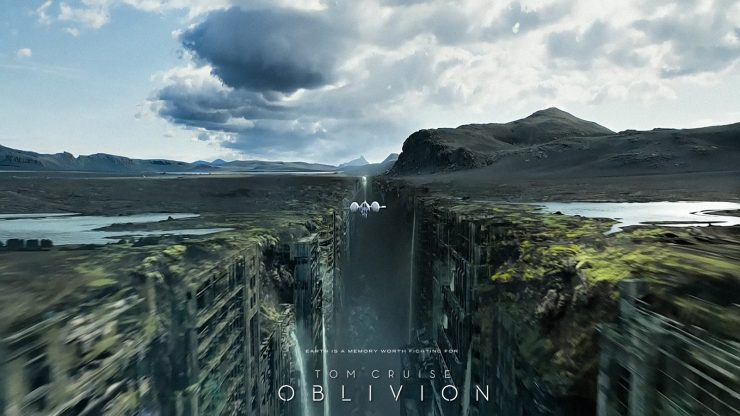Movie Review: Oblivion (2013)
While Oblivion is pleasant enough to watch, it is impressively disappointing. The plot elements promise a love story, a misunderstood war, and a big bad climax. Though each of these points are presented, it takes a long, scenic route that borders on dull. Cinematically, it’s rather stunning; it’s the superficial character and plot development that is wanting. I will own that I rather enjoyed the movie as a whole, but it doesn’t hold up to inspection.
War has destroyed Earth’s moon and ravaged the planet, rendering it uninhabitable. Jack Harper (Tom Cruise) and his partner Victoria (Andrea Riseboroguh) are the two humans planet side, acting as cleanup crew. It’s 2077 and in two weeks, they will reap the reward of their dedicated service and head toward Titan to join the rest of humanity. Jack’s narration reveals a quandary on the unfairness of humans winning the battle, yet having to leave Earth behind. His home. This, along with flashbacks, shows what little of his personal history there is; rather, what little he remembers of it.
Each indentured human has a required mind-wipe. It’s that tiny detail, with the larger information flood, that establishes Jack’s difference. There’s a woman in his memories that should not exist; she is not Victoria. Sadly, this will be a one-sided tale that leaves the promise of the film unfulfilled.
Jack is the grounds keeper: repairing drones, checking for debris, and ensuring that all the hydro rigs (giant machines sucking the ocean’s water and converting it into energy) remain unharmed by the scavengers (scavs) – the aliens that presumably attacked Earth. Victoria is the precise, regulation-obeying member of the team. She lives and works in their home. Jack, on the other hand, regularly goes into non-communication zones, building himself a cabin and filling it with found relics. These are severe rule violations. The two are lovers, but never connect for multiple reasons. One immediate issue is Victoria’s possessiveness and two-dimensionality. The other issue, of course, is the unseen woman of Jack’s memory.
But it takes nearly the entire first half of the film to tell us why this actually matters. In those sixty minutes they work and communicate with the Tet, the giant pyramid in the sky that serves as base and communications. They eat, sleep and entertain themselves in their slick home, built above the clouds like a giant tree house, with a built in suspended pool and incredibly cool tech. While meticulously detailed, this slows the movie to a grinding halt, until an altercation with the scavs occurs and something comes plummeting to Earth’s surface from space.
Jack, against orders, investigates the space junk, finding life support pods. He’s only able to rescue one, and inside is another human, the woman from his memories. Of course. Her name is Julia (Olga Kurylenko), and she’s Jack’s wife. Though the pacing begins to finally pick up speed after this, it’s also where the film falters. Jack is finally clued in that there are other humans on Earth, something he didn’t think possible, and they want his help. With the costuming, directing, stilted plot, and out of place music (it is, however, beautifully written and definitely a soundtrack worth owning), it begins to evince strands of Mad Max, Independence Day, Moon and even I Am Legend. This isn’t to say Oblivion is a copy, or even bad, it just references too many sources for me call it unique.
In the second act, Victoria has a change of heart, and Big Brother kind of goes all 1984 when Jack bucks the system. There’s an oddly anti-climatic aerial chase scene that’s choreographed well, but falls short of thrilling. Then an also anti-climatic shootout that leaves the leader of the humans, Beech (Morgan Freeman), near death. And during all of this, every time Jack and Julia interact, it’s yet another vignette that repeatedly pauses the forward motion of the film. Worse, in the end, we still know nothing of Julia or the humans and how they’d survived or what they’re like. It’s all a story about Jack, his specialness, and perhaps the strength of the human spirit, but only his. Victoria and Julia are two women that are pivotal to the direction the film takes, and they’re left as nothing but MacGuffins. Shame on director/writer Joseph Kosinski for the lost opportunity.
When the movie begins moving toward its actual climax, Jack takes Beech to the big bad. The enemy so reeks of Hal from 2001: A Space Odyssey, that it detracts from what the writers want us to really see: the power and means through which we can be controlled. The ending tumbles together at the end with a speed and finesse (yes, even with its problems, it is handled well) that belies the previous three-fourths of the film. Had the last fifteen minutes been the main focus of the film instead of the very ending, I would have been applauding. This could have been so much more than Tom Cruise with a really cool helicopter.
Oblivion isn’t bad, it just isn’t anything special. And still, it is important to note that despite its meandering pace, the two hours running time doesn’t actually feel very long. The cinematography and landscape shots of the wreaked havoc, spiked with beautiful shots of flourishing oases, are striking. Plus, the gadgets are pretty spectacular, if heavily under-explored. So if it’s eye candy you’re after, you’ll be rewarded; otherwise the film is devoid of substance.
The score:
1 Bag of Eaten Popcorn
2 Action Fists
2 Gasping Moments of Surprise
1 Hour of Tell Me A Real Story!
Oblivion is a movie I’d like to see again someday. Once I get over my disappointed expectations.
Check out the other reviews for Oblivion:






